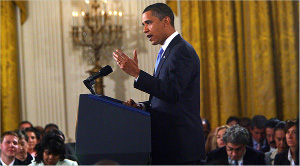Listening is a social skill that is rapidly becoming extinct in the 21st Century, a subject I wrote about in a March blog, saying, "For those people who still retain a semblance of politeness, it has become waiting for one's turn to speak; for those who no longer bother, it has become not to listen at all, but to talk past the next person." This rude behavior is merely annoying in social circles, but can be destructive in the more mission critical circumstances of business and politics.
One of the most common instances of not listening comes in response to multiple questions. Because such queries are usually a rambling set of unrelated issues, it is difficult for any presenter to remember all the diverse parts. Two common responses are to answer only one of the questions and then to turn to another questioner, creating the perception of not listening; or to answer the first question and then to turn back to the questioner and say, "What was your other question?"⎯again creating the perception of not listening.
In the Line of Fire offers a solution to this problem, and Barack Obama offered yet another in last week's press conference. Jeff Zeleny of the New York Times asked him, "During these first 100 days, what has surprised you the most about this office, enchanted you the most about serving in this office, humbled you the most and troubled you the most?"

Tom Shales of the Washington Post called Zeleny's four-part query, "marginally frivolous," but the president did not treat it as such. He immediately reached into his coat pocket, pulled out a pen and said, "Let me write this down," producing a wave of laughter from the crowd gathered in the East Room of the White House.
As Obama began writing, Zeleny began to restate his question, "Surprised ... troubled..."
Obama said, "I've got⎯what was the first one?"
Zeleny repeated, "Surprised ..."
Obama repeated, "Surprised ..."
Zeleny repeated, "Troubled ..."
Obama repeated, "Troubled ..."
Zeleny repeated, "Enchanted ..."
Obama said, "Enchanted," then smiled and added, "Nice," evoking more laughter.
Barack Obama had carefully listened to the question, confirmed that he had listened by restating what he heard, and then re-confirmed by writing what he heard, sending a clear message of his attentiveness. Compare his approach to the usual evasive response from most politicians. As Shales described Obama, "You ask, he'll answer⎯earnestly, disarmingly, enchantingly, even⎯and most of the time convincingly."
Obama represents a refreshing change for a veteran Washington journalist like Shales because he⎯and we have learned to tolerate, if not endure non-answers from politicians. In business, no man or woman can get away with evasiveness. But in business, presenters often give the appearance of evasiveness because they handle multiple questions poorly. They do so because of the complexity of such questions rather than intent to evade, but net effect is the same: not listening.
Take a lesson from the president. Next time someone asks you a set of long, rambling multiple questions about your presentation, reach for your pen, start writing, and confirm what you heard.
Keep listening alive in the 21st Century!